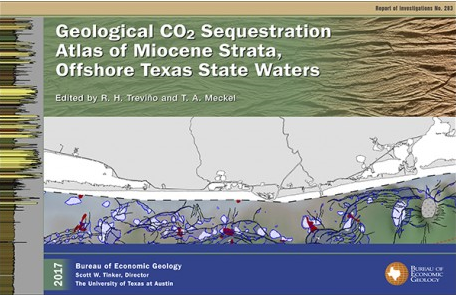GCCC Participates in Recovery Act
The American Recovery and Reinvestment Act, which was enacted in February of 2009 in order to help stimulate the U.S. economy in the wake of the global economic downturn, includes significant domestic spending in the energy sector. Importantly, the Act specifies investment in several different aspects of carbon sequestration technologies. The Gulf Coast Carbon Center (GCCC) is joining with many of their partners to compete for awards that will fund key research in carbon sequestration under the stimulus package. The GCCC and its partners are submitting proposals under several different Funding Opportunity Announcements (FOAs).
In conjunction with Texas House Bill 1796 passed in the 2009 Texas Legislative Session, GCCC will perform a geological characterization of geologic environments deeper than 800 m beneath state-owned submerged lands administered by the Texas General Land Office (GLO). Initial studies indicate that these geological environments are extensive and highly favorable for geologic carbon dioxide sequestration. Under DE-FOA-0000033:Site Characterization of Promising Geologic Formations for CO2 Storage, GCCC proposes to evaluate the characteristics of the geology in these submerged lands to prepare data that could be used by industries seeking to permit storage sites.
The work performed under this initiative includes determination of subsurface stratigraphic properties, evaluation of geologic faults, and identification of potential leakage pathways. Modeling efforts will simulate effects of carbon dioxide injection into the reservoirs in order to study long-term migration. In conjunction with collaborators at the University of Texas Institute of Geophysics, GCCC proposes to study how sub-sea near-surface characteristics can be used to evaluate seals performance to assure permanence of storage. This project also supports evaluation of interactions of CO2 with the marine environment. In particular the Environmental Defense Fund is in the proposal team to participate in the evaluation of risks to marine ecosystems in the Gulf of Mexico.

Click image to view larger.
The Funding Opportunity DE-FOA-0000042 Clean Coal Power Initiative - Round 3 addresses the important, and developing, relationship between coal-fired sources and sinks of carbon dioxide. Under this FOA, GCCC will act as both a scientific and educational liaison between industries that produce carbon and those that have the potential to use and sequester carbon, such as operators involved with EOR, so that progress toward in integrated carbon capture and sequestration systems can successfully evolve. In addition, GCCC will use its expertise and experience to design and develop a monitoring plan appropriate for such an integrated system. This monitoring plan will focus on both deep strata within the injection zone, as well as the more complex zones near the surface. (See figure.)
Research performed under DE-FOA-0000015: Carbon Capture and Sequestration from Industrial Sources and Innovative Concepts for Beneficial CO2 focuses on the effects of injection and reservoir properties. GCCC will make use of its extensive experience assessing geological properties of subsurface reservoirs and developing and implementing monitoring plans in support of its collaborators and sponsors as they begin to propose to injection of anthropogenic carbon dioxide into reservoirs, GCCC, as part of a State Geological Survey and The University of Texas, plays a key role in outreach and education to industry and other academic institutions, as well as the public. Under DE-FOA-0000080: Regional Sequestration Technology Training, GCCC will work with several existing and new collaborators to facilitate dialog among academic and industrial partners and the general public.
GCCC is encouraged by the array of opportunities in which it will participate as part of the Recovery Act initiatives. We recognize the potential that the research performed under the Act has for paving a pathway toward the development of technologies to assess and monitor carbon sequestration reservoirs and the successful, and safe, implementation of sequestration systems.
July 27, 2009

